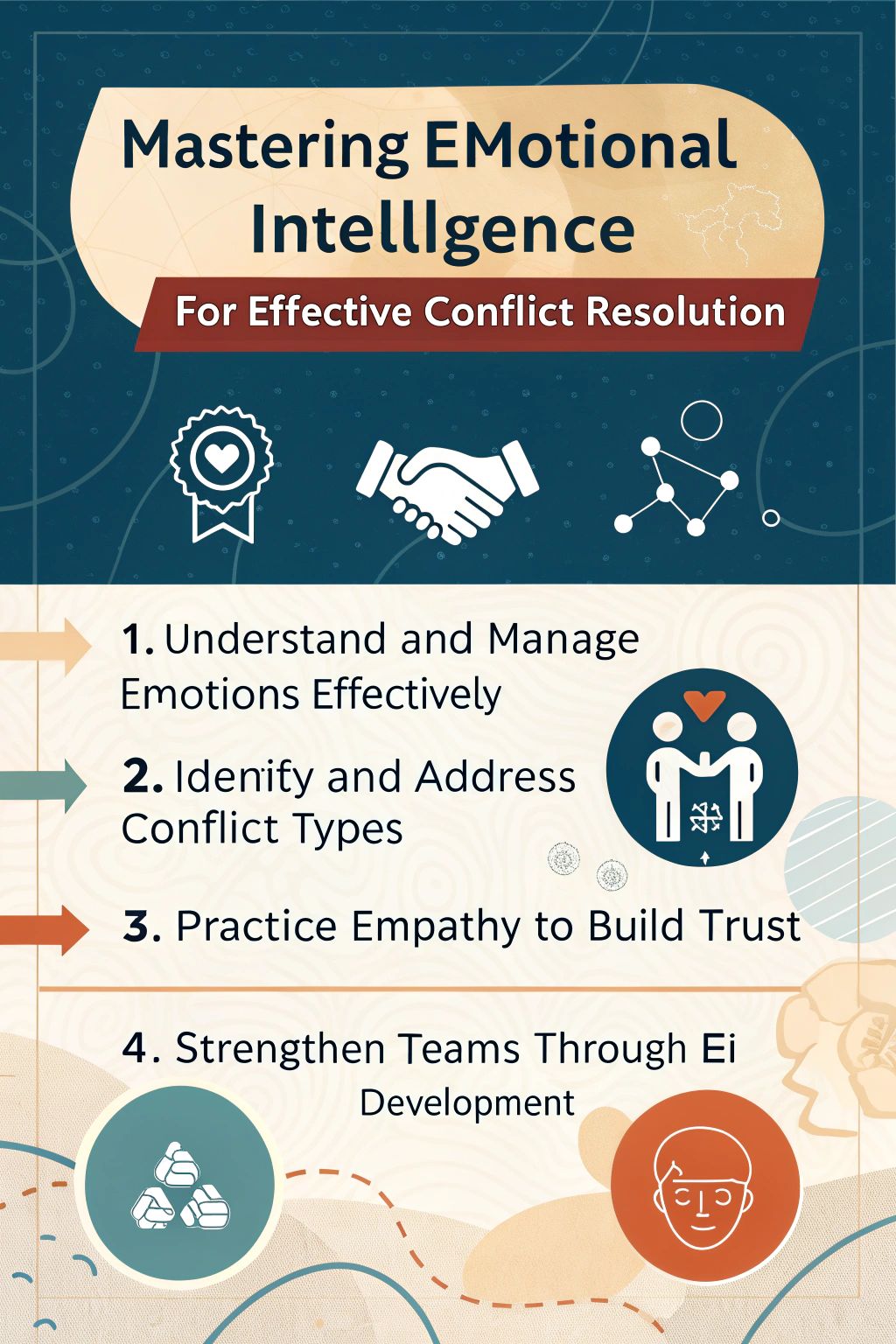Dealing with disagreements at work can be challenging. It often resembles treading lightly, ensuring not to exacerbate the situation. Emotional intelligence becomes an integral factor in managing these issues seamlessly.
One notable aspect to bear in mind is that emotional intelligence is vital for productive conflict management in the workplace. It aids individuals in controlling their emotions and responding constructively during disputes.
This piece aims to instruct you on utilising emotional intelligence to settle conflicts more effectively. Included topics are comprehension of your own emotions and those of others, varieties of conflicts that occur at work, and practical methods to use emotional intelligence for resolving disparities.
Continue reading for an understanding of transforming strained moments into prospects for growth and collaboration. Let’s journey through this together.

Understanding Emotional Intelligence

Understanding Emotional Intelligence is of utmost importance for effective conflict resolution. It involves the ability to comprehend and regulate one’s own emotions, as well as understand and empathise with the feelings of others.
This plays a pivotal role in facilitating effective communication and managing interpersonal relationships.
Definition of Emotional Intelligence
Emotional Intelligence (EI) revolves around the aptitude to discern and handle one’s own emotions and those of others. This concept originated from the minds of Peter Salovey and John D.
Mayer. Daniel Goleman further popularised it through his 1995 book named “Emotional Intelligence.” It is an ability that consists of five main components: self-awareness, self-regulation, motivation, empathy, and social skills.
It proves to be indispensable in a multitude of life spheres, like problem-solving and maintaining personal relationships.
Those blessed with high EI have the capacity to understand their emotions and perceive others’ feelings. They harness such knowledge to direct thinking and behaviour. This skill enables them to deal with stress efficiently, converse with clarity and respect, relate to others’ feelings, surmount difficulties, and calm conflicts.
Using emotional intelligence in resolving disagreements morphs potential disputes into a joint endeavour towards shared goals.
Importance in Conflict Resolution
High emotional intelligence (EI) plays a key role in solving disagreements. People with high EI can recognise their own feelings and the emotions of others. This skill allows them to understand different viewpoints during conflicts.
They are also good at keeping conversations positive. These abilities help prevent minor misunderstandings from turning into bigger problems.
Having strong EI leads to better problem-solving strategies and communication in stressful situations. It reduces the chances of conflict getting worse, leading to lower stress levels, fewer people staying away from work, and less risk of mental health issues.
People who apply emotional intelligence in conflict resolution create an environment where everyone feels heard and respected. This builds trust among team members and improves job performance across the board.
Types of Conflict in the Workplace
Conflict in the workplace can manifest in various forms, impacting team dynamics and overall productivity. Task conflict arises from variances in opinions about work-related tasks and goals, whereas relationship conflict stems from personal disagreements among colleagues. Value conflict may occur when individuals hold differing beliefs or principles that affect how they approach their roles within the organisation. Understanding these types of conflicts is vital for developing effective strategies to address them proactively and maintain a positive work environment.
Task Conflict
Task conflict happens in the workplace over differences in views regarding work tasks, roles, methods, and expectations. For example, teammates might not agree on ideas because of competition or past resentments.
This type of conflict is about the job itself—not personal issues.
To resolve these conflicts, a team leader or project manager often steps in. They use mediation to help everyone work together better. The goal is to find a middle ground that encourages collaboration and compromise.
This approach helps manage emotions and improve understanding between parties involved.
Relationship Conflict
Relationship conflict happens because of personality clashes, different lifestyles, or ways people deal with disputes. Someone might get upset over another person’s hobbies or life choices.
This kind of conflict needs careful handling to prevent it from getting worse. Active listening and showing empathy are powerful tools here. Sometimes, though, a manager might have to step in to help solve the issue.
Using emotional intelligence plays a key role in managing relationship conflicts at work. It involves understanding and controlling our own emotions and recognising how others feel.
People with high emotional intelligence can calm situations down before they escalate. They listen carefully and show respect for other’s viewpoints, which makes everyone involved feel heard and understood.
Their ability to empathise helps find common ground and resolve disputes without hurting personal or professional relationships.
Value Conflict
Value conflict emerges from profound discrepancies in viewpoints, such as political or moral perspectives. It often carries high emotional intensity. For instance, a team might be split on collaborating with a client due to their political stances.
This type of discord is difficult as it provokes individuals’ fundamental principles. An effective strategy for managing value conflicts involves conducting one-on-one dialogues. These exchanges aim to identify common interests and promote admiration and comprehension amongst team members.
Settle these disagreements through problem-solving abilities and negotiation expertise. Emotional intelligence proves highly useful in this context. It aids individuals in regulating their emotions amid intense debates regarding personal beliefs.
Given high emotional intelligence, individuals can maintain composure and sympathise with differing views of others. This method averts conflict intensification and encourages a cooperative atmosphere despite diverging values.
Practical Strategies for Using Emotional Intelligence in Conflict Resolution
Using emotional intelligence in conflict resolution involves enhancing self-awareness, fostering effective communication, practicing empathy, and employing self-regulation. These strategies enable individuals to manage their emotions effectively and understand the feelings of others while facilitating clear and respectful dialogue in resolving conflicts.
Enhancing Self-Awareness
Improving self-awareness is a principal move in handling feelings constructively during workplace disputes. This includes acknowledging one’s emotional situation and its effect on thoughts and behaviour.
Training sessions on how to manage stress can assist people in recognising their emotional catalysts and reactions. These activities promote contemplating individual experiences, which results in improved emotion regulation.
Promoting the practice of mindfulness and meditation also significantly contributes to improving self-awareness. These strategies allow individuals to witness their feelings without judgement, mastering tranquillity in stressful situations.
This method fortifies people’s abilities to regulate their emotions, making them more proficient at dealing constructively and sympathetically with conflicts involving others.
Fostering Effective Communication
Successful communication is pivotal for conflict management at work. This embraces attentive listening, where complete focus is given to the person speaking, demonstrating understanding of their conveyed message.
Promoting questioning for lucidity and rephrasing can also confirm a unified comprehension. These processes avert misinterpretations that could heighten discord.
Workshops on providing positive criticism are also necessary. They train individuals to articulate their ideas and sentiments in a clear and respectful manner. This aids in preserving faith within the team, simplifying the collective problem-solving process.
Faith is critical as it promotes collaboration and lessens prejudice in discussions.
Practicing Empathy and Active Listening
Practising empathy and attentive listening are vital abilities for successful conflict resolution in the workplace. Empathy enables individuals to grasp and empathise with the feelings of others, fostering an environment of consideration and comprehension.
Attentive listening supports effective communication, ensuring that everyone feels heard and understood without criticism or disruption.
By exercising empathy, emotionally intelligent individuals can lessen the chances of conflicts escalating by aiding others in managing their emotions and comprehending the emotions at play in the conflict.
This improves emotional intelligence overall, encouraging a cooperative approach to resolving conflicts effectively. Through practising attentive listening, individuals can articulate their thoughts and feelings clearly while allowing others to do the same, nurturing an environment where emotions are constructively managed for mutual problem-solving.
Ultimately, mastering these skills is crucial for establishing a work environment where emotional needs are recognised and conflict management strategies function optimally for everyone involved.
Employing Self-Regulation
Leaders in conflict resolution should focus on employing self-regulation, which involves managing their own emotions and maintaining a calm demeanour. By staying composed and using relaxed body language, they can diffuse tense situations and prevent conflicts from escalating.
For instance, workshops on self-awareness and stress management can provide practical guidance for individuals to enhance their emotional intelligence skills, contributing to effective conflict resolution.
Moreover, training sessions that emphasise the delivery of constructive feedback are valuable tools for cultivating self-regulation in conflict scenarios. These initiatives enable individuals to handle challenging interactions with composure and poise, essential qualities for managing workplace conflicts effectively while promoting a collaborative environment.
Enhancing Emotional Intelligence in Others
In addition, it is also advantageous to suggest undergoing an EI assessment to pinpoint areas for improvement and exploring EI training programmes featuring evaluations and supplementary resources.
Furthermore, practical approaches like practicing deep breathing during difficult moments, honing active listening abilities, and being receptive to diverse perspectives can equally assist in enriching emotional intelligence among teams.
Ultimately, cultivating emotional intelligence in others is pivotal in establishing trust, collaboration, and problem-solving skills necessary for effectively addressing conflicts.
Conclusion
Mastering emotional intelligence is essential for resolving workplace conflicts effectively. By improving self-awareness, promoting effective communication, and practising empathy and active listening, individuals can manage conflicts constructively.
Emotional intelligence not only enables the management of personal emotions but also plays a vital role in comprehending and managing the emotions of others involved in the conflict.
Encouraging others to enhance their emotional intelligence can help decrease the probability of conflicts, ultimately fostering a more harmonious and productive work environment. It’s crucial that leaders acknowledge the importance of emotional intelligence in conflict resolution and work towards nurturing this vital skill within themselves and their teams.
MindOwl Founder – My own struggles in life have led me to this path of understanding the human condition. I graduated with a bachelor’s degree in philosophy before completing a master’s degree in psychology at Regent’s University London. I then completed a postgraduate diploma in philosophical counselling before being trained in ACT (Acceptance and commitment therapy).
I’ve spent the last eight years studying the encounter of meditative practices with modern psychology.

